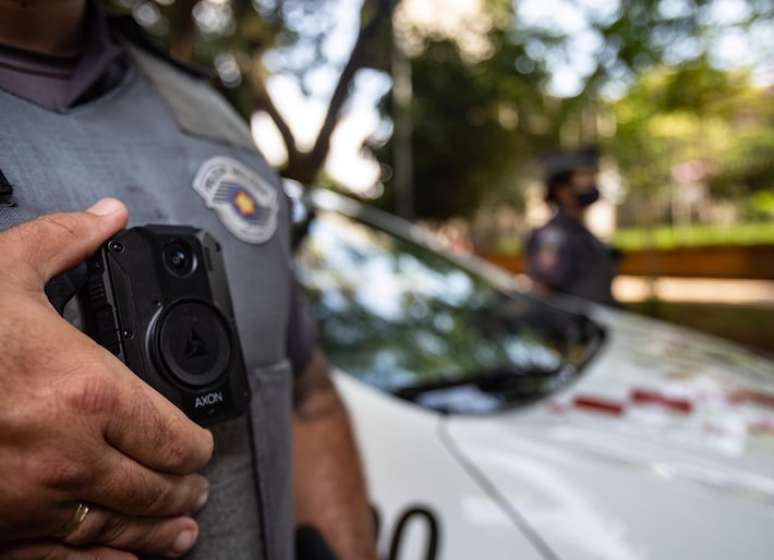The Sao Paulo government responded to Minister Barroso’s request for information; the equipment can have four recording patterns
The last day of the deadline granted by the Minister of the Federal Court (STF) Luís Roberto Barroso, the government of São Paulo responded this Friday, 6, to the request for information on the contract signed between the Military Police and the company Motorola Solutions Ltda., for the supply of body cameras for police personnel.
The doubts arose from the change in the model of equipment: the cameras currently used by police officers record continuously; In this new model, initiated through this contract, the police officer can turn off the equipment, which is the subject of criticism from experts. In the document sent to the STF, the government of Sao Paulo informs that it will be possible to activate the cameras remotely, regardless of the will of the policeman.
The order to the São Paulo government to present the contract and other clarifications was issued by Barroso on November 21, during the judicial proceedings during which the São Paulo government pledged to expand the acquisition and use of bodysuits chamber in the activities of the Military Police. The government initially had five working days to respond, but asked the STF minister to extend the deadline by another five days.
Governor Tarcísio de Freitas (Republicans), Thursday 5, he said he was wrong to question the cameras’ effectiveness and defended the use of the equipment. Once critical of the resource, he is now supportive of it.
The government of São Paulo reported that it sent to the STF copies of the three body camera contracts currently in force at the Military Police. In addition to the contract signed with Motorola Solutions, the two contracts with Axon Advanta were forwarded in September, which have been extended and are valid until January and March 2025.
According to the government, tests are scheduled for December 10 to validate the functionality of the new body cameras, including remote activation, regardless of the will of the police officer in the event of an event, in intentional and automatic mode.
The government has described four recording models that do not depend on the police officer’s use of the camera:
- via remote activation: Recording can be activated through integration with the Military Police Operations Center incident dispatch system or by battalion supervisors.
- by reactivation after intentional shutdown: At the end of a recording, the device will send a message to the Military Police incident system, which can remotely restart the recording.
- via perimeter activation via Bluetooth: This mode is activated without any human interaction. When a recording begins, all devices within Bluetooth technology range, up to approximately 10 meters, will also begin recording automatically. As the police officer moves, other cameras within that radius will also be activated.
- via pop detection: the Military Police requested technical studies on the feasibility of this type of drive from Motorola’s Research and Development sector.
Program and tests
The SSP letter presents the contract execution phases, classifying them as completed and ongoing. Among the actions carried out is the completion, in November, of the adjustments to the data center which will store the acquired files.
Among the ongoing actions are the system validation tests, scheduled for December 10th. At that time it will be verified whether Motorola has complied with all the obligations indicated in the communication. If a problem is found, the start of contract performance will be postponed and current body camera contracts will be extended, the government says.
Once all contract requirements are met, contract execution will begin in phases, with new cameras being rolled out gradually every 90 days. The first four phases will target police units currently served by contracts with Axon Advanta. The fifth phase will be assigned to new PM battalions.
According to the government, the new system will continue to allow access to evidence relating to specific cases, captured by audiovisual images, whenever requested by supervisory bodies, but with greater efficiency, maintaining the guarantee of chain of custody and time stamp.
Signed in September, the contract with Motorola resulted in a saving for the exchequer of 45.9% compared to the previous auction, the government says. The new agreement, which involves the operation of 12,000 cameras, represents an annual investment of R$51.9 million, compared to the R$96 million paid in the previous contract, which included 10,125 devices.
Another advantage claimed by the government is that, since it is a service contract, the company is responsible for carrying out all maintenance, including replacing batteries and equipment in case of damage.
Source: Terra
Rose James is a Gossipify movie and series reviewer known for her in-depth analysis and unique perspective on the latest releases. With a background in film studies, she provides engaging and informative reviews, and keeps readers up to date with industry trends and emerging talents.







